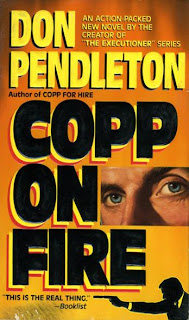 Tom Piccirilli has successfully made the transition from horror writer to mystery writer over the past few years, and while the genre he writes has changed, the moody atmosphere, the well-developed storylines and overall quality has not. He won four Stoker Awards for his work in the horror field and he recently won a Thriller Award for his crime novel The Midnight Road.
Tom Piccirilli has successfully made the transition from horror writer to mystery writer over the past few years, and while the genre he writes has changed, the moody atmosphere, the well-developed storylines and overall quality has not. He won four Stoker Awards for his work in the horror field and he recently won a Thriller Award for his crime novel The Midnight Road.I have been an avid Piccirilli reader since I discovered his horror novel The Night Class, and I always look forward to the release of his latest novel. But as good as his novels are his short work is even better. It—his short work—radiates mood, theme, violence, and a certain dark destiny that envelopes both protagonist and reader alike. When you read a story by Tom Piccirilli it sticks to you for awhile. And you are usually damn glad it is still there, gnawing at your psyche, gaining more and more nuance and meaning with each swirl of thought and idea.
The point? I’ve read two short stories by Tom Piccirilli in the past week and both were terrific. The first is a gem in the most recent issue of Ellery Queen Mystery Magazine titled “Between the Dark and the Daylight” that is pitch-perfect. It is hardboiled, literate and surprising. I am going to leave my comments at that, because Bill Crider has already reviewed it over at Nasty. Brutish. Short. far better and in less space than I could.
The story I do want to talk about is “Bereavement.” The protagonist is an unnamed man who has lost nearly everyone close to him—his parents, a brother, two uncles, two aunts, and a great-grandfather. All in a twelve-month period. When the story opens the man is on another “deathwatch,” but this time it is his son who is dying. The man holds a vigil at the hospital hoping, needing, his young son to awaken one last time to hear his voice, tell him “I love you,” anything. I’ll leave it there, because to reveal more would ruin the story.
“Bereavement” is a story that drops the reader with a nasty hook. Mr. Piccirilli creates the scene perfectly—the lonely father with a dying son, the grief, shame and guilt one feels at the passing of a loved one—and then in the space of one sentence turns it on a dime not once, but twice. The plot is so tightly crafted that it can’t go anywhere but where Piccirilli takes it and the reader can do nothing except admire the skill and simple beauty of it.
The prose is tight and lucid, and crafted with a heavy sorrow—“If you love, you lose. We all know it. But you also gain a heaviness of shadow and soul that will serve you throughout life in some capacity. It’s as natural and inevitable as it is righteously unfair.”
The story straddles the line between horror and mystery—its actual location is somewhere near the resting spot of the The Twilight Zone—and it is equally satisfying in both genres. “Bereavement” is the best short story I have read this year, and really, I can’t imagine a better one will find me.
“Bereavement” was originally published in the anthology Five Strokes to Midnight and is also available in the terrific anthology A Prisoner of Memory and 24 of the Year’s Best Crime and Mystery Stories.




